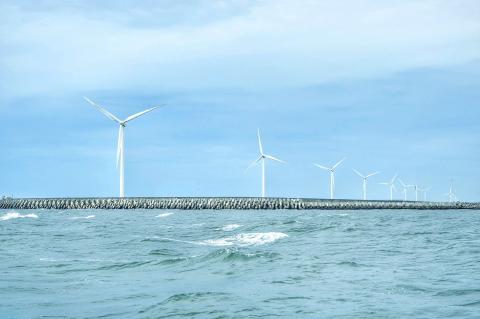The Executive Yuan has approved measures to liberalize the power market and break up state-run Taiwan Power Co (Taipower, 台電), as well as increase the number of public kindergartens by 1,000 by 2020 to expand childcare coverage and increase women’s participation in the workforce.
The Executive Yuan yesterday passed an amendment of the Electricity Act (電業法) that would deregulate the power market and promote “green” energy.
The proposal calls for Taipower to transform into a holding company with subsidiaries.

Photo courtesy of Taiwan Power Co
According to the draft amendments, “green” energy firms will be allowed to sell and transmit electricity to users directly, with pricing being freely negotiated between generating companies and clients, Bureau of Energy Director-General Lin Chuan-neng (林全能) said.
Currently, firms can only sell power to Taipower, Lin said.
Businesses will be permitted to operate traditional power plants, but they can only sell electricity to Taipower, he said.
To complete the separation of power generation and electricity distribution, Taipower has to be divided into subsidiary companies in six to nine years following the passage of the draft amendment by the Legislative Yuan, with a company responsible for power generation and another for distribution and retailing, Lin said.
The “public electricity retailing industry,” which is to be composed of Taipower spinoffs, would be obliged to supply power to the public, which will also have the choice to purchase “green” energy, he said, adding that “non-renewable” electricity rates would be regulated to offset price fluctuations due to global fuel costs.
The Executive Yuan was planning an across-the-board liberalization to deregulate both the traditional and renewable energy markets, but the latest amendment is mainly focused on the “green” energy sector, Executive Yuan spokesman Hsu Kuo-yung (徐國勇) said.
The traditional power sector would be liberalized in the next round of legislation to allow operators to freely enter electricity retailing, Hsu said.
“The government has adopted a gradual approach to liberalization to prevent the legislation from being stalled,” he said.
The legislation is necessary, as Taipower’s monopoly of the industry is what is prohibiting rapid growth in the renewable energy industry, Premier Lin Chuan (林全) said, adding that it is the government’s priority to liberate the “green” energy market during this legislative session.
“Criticism saying that the legislation would lead to higher electricity prices and the monopolization of the power market by business groups is incorrect,” Hsu quoted the premier as saying.
“The percentage of green energy in the nation’s power grid is too low and even if the price of green energy increases several times over [following the liberalization], it would not affect electricity supply,” Minister of Economic Affairs Lee Chih-kung (李世光) said.
Hydroelectric and nuclear power plants will continue to be state-run.
Meanwhile, the Executive Yuan is to budget NT$6.2 billion (US$196.6 million) to establish 1,000 kindergartens in the next four years.
Minister of Education Pan Wen-chung (潘文忠) said the plan is to boost the number of “non-profit kindergartens” — facilities run privately on refurbished public properties — and public kindergartens.
The plan is expected to raise the percentage of children enrolled in public or non-profit kindergartens from 30 percent to 40 percent by 2020, Pan said.
“The measure will provide affordable childcare to allow women to enter the workforce,” Pan said.

SECURITY: As China is ‘reshaping’ Hong Kong’s population, Taiwan must raise the eligibility threshold for applications from Hong Kongers, Chiu Chui-cheng said When Hong Kong and Macau citizens apply for residency in Taiwan, it would be under a new category that includes a “national security observation period,” Mainland Affairs Council (MAC) Minister Chiu Chui-cheng (邱垂正) said yesterday. President William Lai (賴清德) on March 13 announced 17 strategies to counter China’s aggression toward Taiwan, including incorporating national security considerations into the review process for residency applications from Hong Kong and Macau citizens. The situation in Hong Kong is constantly changing, Chiu said to media yesterday on the sidelines of the Taipei Technology Run hosted by the Taipei Neihu Technology Park Development Association. With

A US Marine Corps regiment equipped with Naval Strike Missiles (NSM) is set to participate in the upcoming Balikatan 25 exercise in the Luzon Strait, marking the system’s first-ever deployment in the Philippines. US and Philippine officials have separately confirmed that the Navy Marine Expeditionary Ship Interdiction System (NMESIS) — the mobile launch platform for the Naval Strike Missile — would take part in the joint exercise. The missiles are being deployed to “a strategic first island chain chokepoint” in the waters between Taiwan proper and the Philippines, US-based Naval News reported. “The Luzon Strait and Bashi Channel represent a critical access

CARROT AND STICK: While unrelenting in its military threats, China attracted nearly 40,000 Taiwanese to over 400 business events last year Nearly 40,000 Taiwanese last year joined industry events in China, such as conferences and trade fairs, supported by the Chinese government, a study showed yesterday, as Beijing ramps up a charm offensive toward Taipei alongside military pressure. China has long taken a carrot-and-stick approach to Taiwan, threatening it with the prospect of military action while reaching out to those it believes are amenable to Beijing’s point of view. Taiwanese security officials are wary of what they see as Beijing’s influence campaigns to sway public opinion after Taipei and Beijing gradually resumed travel links halted by the COVID-19 pandemic, but the scale of

Pope Francis is be laid to rest on Saturday after lying in state for three days in St Peter’s Basilica, where the faithful are expected to flock to pay their respects to history’s first Latin American pontiff. The cardinals met yesterday in the Vatican’s synod hall to chart the next steps before a conclave begins to choose Francis’ successor, as condolences poured in from around the world. According to current norms, the conclave must begin between May 5 and 10. The cardinals set the funeral for Saturday at 10am in St Peter’s Square, to be celebrated by the dean of the College